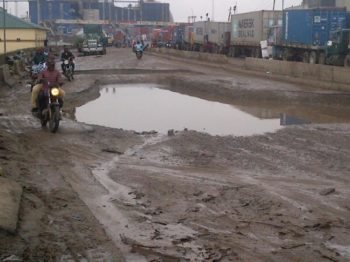
Effort by the Federal Government to improve the ease of doing business in the country will be frustrated by lack of infrastructure in the country including the dilapidated port access roads, a senior Customs official has said.
The officer who craved anonymity told SHIPS & PORTS DAILY that the ease of doing business in the country goes beyond improving cargo clearance procedures at the port but noted that factors such as good access roads and power must be put in place before the measure can succeed.
“Nigeria presently ranks 169 in the ease of doing business, 187 in access to electricity and 173 in terms of transport and road network. Ease of doing business includes physical infrastructures and not because of alerts issued by Customs,” he said.
He noted that Nigeria has one of the best trade processes in the world but still lags behind in the ease of doing business because the much-needed infrastructure to support economic activity has not been put in place.
He added that good haulage system is also an important factor to be considered for Nigeria to improve on its ease of doing business with regards to port operation.
Meanwhile, Controller, Tin can Island Port command, Comptroller Yusuf Bashar has warned agents to limit their service to freight only to avoid being punished for the offense of an importer.
Speaking against the backdrop of the interception of the 440 rifles intercepted at the Tin Can Island port penultimate week during a training organised by the command for maritime journalists, Bashar said agents will continue to suffer if they assume the responsibility of importers in cargo clearance at the port.
“Nigerian agents will continue to suffer if they take responsibility of an importer and claim responsibility on the content of a container while he is not there. They must limit their service to freight alone,” he said.
On complaints of incessant alert placed on cargoes by Customs, Bashar said “Alerts don’t just come from nothing. Customs issue alert based on HS code, description given and country of origin so agent s should not be complaining about alerts because he has all the documents that determines value but when he tries to do the wrong thing, he gets alert”
The Customs boss said the training was organised by the command to train journalists on quality and objective reportage of customs operation.
He disclosed that since the training centre was established, the command has trained over 147 people including Customs officers, agents and other stakeholders.
Copyright Ships & Ports Ltd. Permission to use quotations from this article is granted subject to appropriate credit given to www.shipsandports.com.ng as the source.
